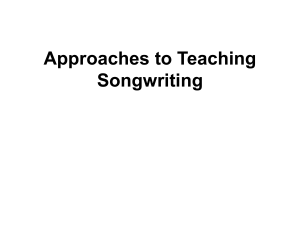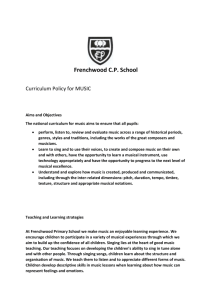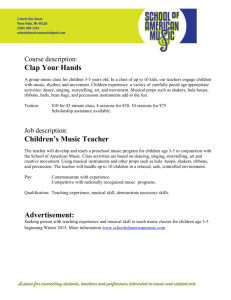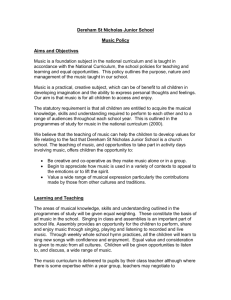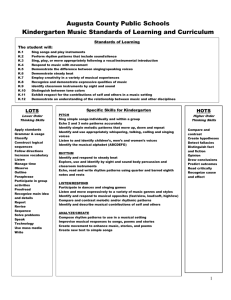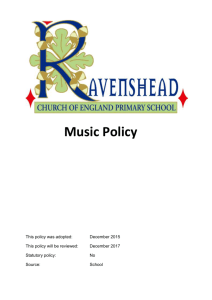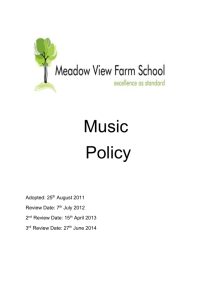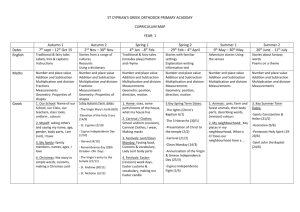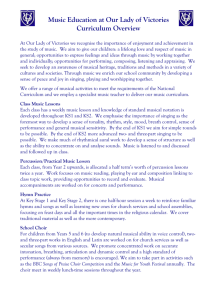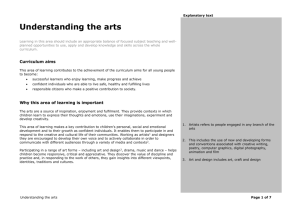Music Policy 2011 INTRODUCTION We at Tranmere Park Primary
advertisement
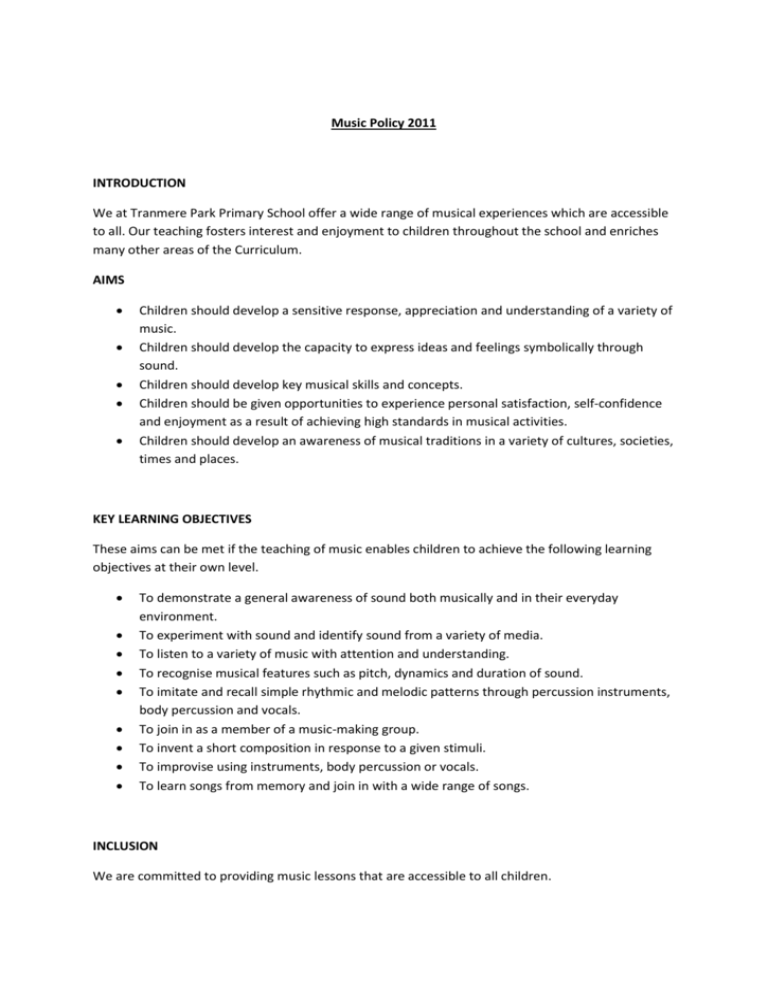
Music Policy 2011 INTRODUCTION We at Tranmere Park Primary School offer a wide range of musical experiences which are accessible to all. Our teaching fosters interest and enjoyment to children throughout the school and enriches many other areas of the Curriculum. AIMS Children should develop a sensitive response, appreciation and understanding of a variety of music. Children should develop the capacity to express ideas and feelings symbolically through sound. Children should develop key musical skills and concepts. Children should be given opportunities to experience personal satisfaction, self-confidence and enjoyment as a result of achieving high standards in musical activities. Children should develop an awareness of musical traditions in a variety of cultures, societies, times and places. KEY LEARNING OBJECTIVES These aims can be met if the teaching of music enables children to achieve the following learning objectives at their own level. To demonstrate a general awareness of sound both musically and in their everyday environment. To experiment with sound and identify sound from a variety of media. To listen to a variety of music with attention and understanding. To recognise musical features such as pitch, dynamics and duration of sound. To imitate and recall simple rhythmic and melodic patterns through percussion instruments, body percussion and vocals. To join in as a member of a music-making group. To invent a short composition in response to a given stimuli. To improvise using instruments, body percussion or vocals. To learn songs from memory and join in with a wide range of songs. INCLUSION We are committed to providing music lessons that are accessible to all children. Our music scheme contains a wide range of resources from different cultures, societies and religious backgrounds. Children with Special Educational Needs are catered for as appropriate by use of resources, support assistants and intended learning outcomes. Gifted and talented children are differentiated as above and our strong links with Leeds ‘ARTforms’ (Our Music Support Service) keeps the school up-to-date with opportunities for children showing more capable musical ability. Some kS2 pupils take part in the Leeds School choir on an annual basis. Specific interests of children are taken into account when planning music lessons. Performance Assemblies Each term pupils have the opportunity to audition to participate in the Performance Assembly. Children can perform a dance, a song, a piece of drama, read a poem or play an instrument. Pupils having peripatetic music lessons are encouraged to perform as a solo or in a group at least once each year. PLANNING The whole school uses the ‘Music Express’ Scheme as a guide for planning, teaching and learning and assessment. The scheme is based on the QCA units and provides coverage and progression of all National Curriculum programmes of study. Year groups join together with at least 2 members of staff to deliver focused music lessons. Access to the music room and resources is time-tabled to run alongside these lessons allowing an area which can be used for small group work if needed. Our emphasis is on making the teaching of music cross-curricular wherever possible. LONG TERM PLANNING As the scheme units are progressive within each year group, the long term planning will mean units are taught in chronological order from the start of the school year. Where possible teachers are encouraged to make links to current topics within the International Primary Curriculum and select more appropriate choices of music if necessary. Progression is also planned for from year group to year group. SHORT / MEDIUM TERM PLANNING Teachers use the lesson activity sheets from the ‘Music Express scheme’ as a basis for weekly planning. Teachers are encouraged to annotate plans noting changes and resources used. Where possible topic related music can be substituted instead of the suggested music in the scheme. Music lessons can be organised with whole class, group, paired and individual tasks. Music appreciation can be discussed as a whole school or in Key Stages during assembly time. ASSESSMENT Informal notes and comments are recorded on short term and medium term planning to inform planning. We use assessment of ‘Ows and Wows’ (Children with strengths and weaknesses) at the end of a taught unit. RESOURCES The Music room is a central storage point for all music resources (e.g. books, CDs, instruments). Each year has a ‘Music Express’ teachers book and CDs. Each year has software for use on the Interactive whiteboard. CROSS CURRICULAR LINKS Where possible music should be used to enhance other areas of the curriculum and as topic songs and resources are used wherever possible within time-tabled music lessons. Whenever possible music projects run by skilled musicians are organised to link with subjects throughout the school. We also promote learning through song e.g. times tables, science songs etc. ICT AND MUSIC The use of ICT is included in the planning of music lessons and to help enhance other subjects. Resources include, computer / Interactive Whiteboard software, keyboards, audio-visual equipment and use of the overhead projector. ICT should be used as one way of motivating pupils when appropriate to the specific learning objective. ROLES AND RESPONSIBILITIES OF THE MUSIC CO-ORDINATOR The overall responsibility of the management of music is with the Music Co-ordinator. He / she will: Give advice and support on the planning, teaching and assessment of music, assigning members of staff on suitable courses when needed. Order and monitor resources. Liaise with and monitor peripatetic services in school. Liaise with ARTforms (The Music Support Service). Organise extracurricular music opportunities. EXTRA CURRICULAR MUSIC Peripatetic music lessons- woodwind, keyboard and guitar Workshops at West Park Music Centre Hymn / song practice (whole school once a month). Recorder club (ability grouped) Orchestra Professional musicians to come in to school and perform
